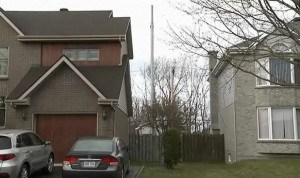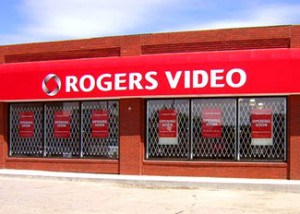
This monopole cell tower antenna just showed up one day in the backyard of this Kirkland, PQ resident.
Rogers Communications installed a 49-foot monopole cellular antenna in the backyard of a Kirkland, Que. resident earlier this year, but the only signals being transmitted are discussions over its fate at town hall.
Residents were furious when a neighbor leased out a portion of a residential backyard to Rogers, who claims the small cube antenna mounted on the pole will improve cell reception in the immediate area. Ever since Stop the Cap! first covered this story earlier this year, local officials have been flummoxed about what they can do about the antenna, which is currently non-operational.
“For now (there is) no resolution, but talks are progressing,” Kirkland’s director general Joe Sanalitro told The West Island Gazette. “We are demanding it come down.”
Rogers and Kirkland officials have been meeting about the antenna, which has generated considerable interest and complaints over whether the company used a zoning loophole to sneak the antenna into the neighborhood.
If allowed to stand, residents fear Rogers and other cell companies could offer cash incentives to other homeowners to erect similar towers, increasing visual pollution.
Industry Canada rules state towers less than 15 meters are excluded from municipal notification rules and do not require permits to install. Rogers was evidently aware of this rule — its Kirkland antenna tops out at 14.5 meters, just shy of the height limit.


 Subscribe
Subscribe




